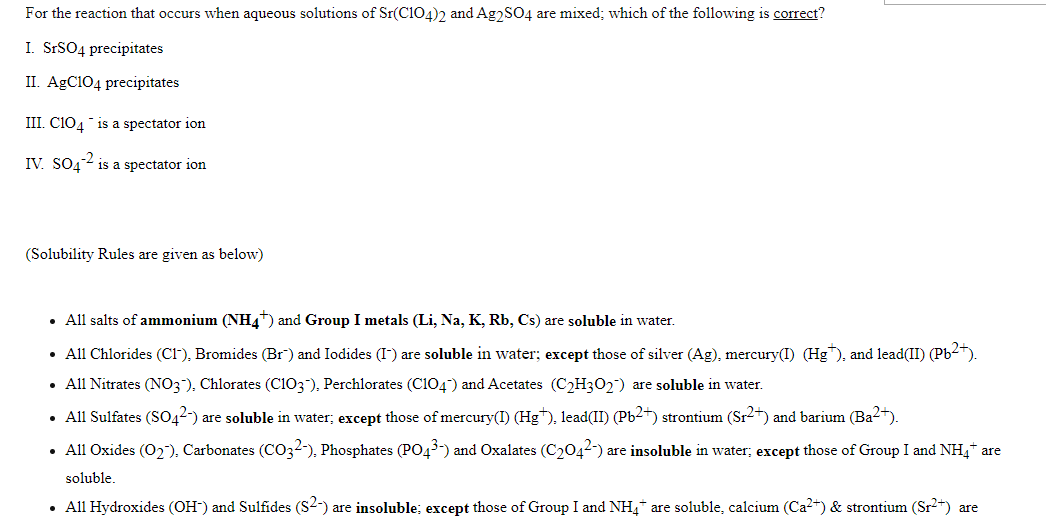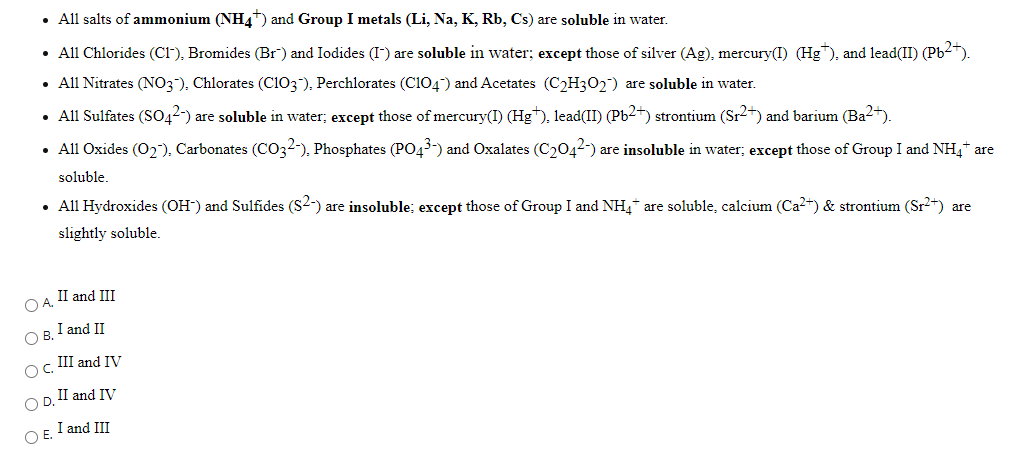For the reaction that occurs when aqueous solutions of Sr(Ci04)2 and Ag2SO4 are mixed; which of the following is correct? I. SrSO4 precipitates II. AGCI04 precipitates III. CIO4 is a spectator ion IV. SO42 is a spectator ion
For the reaction that occurs when aqueous solutions of Sr(Ci04)2 and Ag2SO4 are mixed; which of the following is correct? I. SrSO4 precipitates II. AGCI04 precipitates III. CIO4 is a spectator ion IV. SO42 is a spectator ion
Principles of Modern Chemistry
8th Edition
ISBN:9781305079113
Author:David W. Oxtoby, H. Pat Gillis, Laurie J. Butler
Publisher:David W. Oxtoby, H. Pat Gillis, Laurie J. Butler
Chapter15: Acid–base Equilibria
Section: Chapter Questions
Problem 98AP
Related questions
Question

Transcribed Image Text:For the reaction that occurs when aqueous solutions of Sr(C104)2 and Ag2SO4 are mixed; which of the following is correct?
I. SRSO4 precipitates
II. AgC104 precipitates
III. Ci04 is a spectator ion
IV. SO42 is a spectator ion
(Solubility Rules are given as below)
• All salts of ammonium (NH4) and Group I metals (Li, Na, K, Rb, Cs) are soluble in water.
• All Chlorides (CI), Bromides (Br") and Iodides (I) are soluble in water; except those of silver (Ag), mercury(I) (Hg"), and lead(II) (Pb2+).
• All Nitrates (NO3), Chlorates (C103), Perchlorates (C104) and Acetates (C2H302) are soluble in water.
• All Sulfates (SO42-) are soluble in water; except those of mercury(I) (Hg*), lead(II) (Pb2+) strontium (Sr2*) and barium (Ba2+).
• All Oxides (O2), Carbonates (CO32-), Phosphates (PO43) and Oxalates (C2042-) are insoluble in water; except those of Group I and NH,* are
soluble.
• All Hydroxides (OH) and Sulfides (S2-) are insoluble; except those of Group I and NH4* are soluble, calcium (Ca2") & strontium (Sr") are

Transcribed Image Text:• All salts of ammonium (NH4) and Group I metals (Li, Na, K, Rb, Cs) are soluble in water.
• All Chlorides (CI), Bromides (Br") and Iodides (I) are soluble in water; except those of silver (Ag), mercury(I) (Hg"), and lead(II) (Pb2+).
• All Nitrates (NO3), Chlorates (C103), Perchlorates (C104) and Acetates (C2H302) are soluble in water.
• All Sulfates (SO42-) are soluble in water; except those of mercury(I) (Hg*), lead(II) (Pb2+) strontium (Sr2+) and barium (Ba2+).
• All Oxides (02), Carbonates (CO3²-), Phosphates (PO43-) and Oxalates (C2042-) are insoluble in water; except those of Group I and NH,* are
soluble.
• All Hydroxides (OH") and Sulfides (S2-) are insoluble; except those of Group I and NH,* are soluble, calcium (Ca2+) & strontium (Sr2+) are
slightly soluble.
II and III
OA.
O B. I and II
III and IV
OC.
II and IV
OD.
O E. I and III
Expert Solution
This question has been solved!
Explore an expertly crafted, step-by-step solution for a thorough understanding of key concepts.
Step by step
Solved in 2 steps

Knowledge Booster
Learn more about
Need a deep-dive on the concept behind this application? Look no further. Learn more about this topic, chemistry and related others by exploring similar questions and additional content below.Recommended textbooks for you

Principles of Modern Chemistry
Chemistry
ISBN:
9781305079113
Author:
David W. Oxtoby, H. Pat Gillis, Laurie J. Butler
Publisher:
Cengage Learning

Chemistry: Matter and Change
Chemistry
ISBN:
9780078746376
Author:
Dinah Zike, Laurel Dingrando, Nicholas Hainen, Cheryl Wistrom
Publisher:
Glencoe/McGraw-Hill School Pub Co

Chemistry for Engineering Students
Chemistry
ISBN:
9781337398909
Author:
Lawrence S. Brown, Tom Holme
Publisher:
Cengage Learning

Principles of Modern Chemistry
Chemistry
ISBN:
9781305079113
Author:
David W. Oxtoby, H. Pat Gillis, Laurie J. Butler
Publisher:
Cengage Learning

Chemistry: Matter and Change
Chemistry
ISBN:
9780078746376
Author:
Dinah Zike, Laurel Dingrando, Nicholas Hainen, Cheryl Wistrom
Publisher:
Glencoe/McGraw-Hill School Pub Co

Chemistry for Engineering Students
Chemistry
ISBN:
9781337398909
Author:
Lawrence S. Brown, Tom Holme
Publisher:
Cengage Learning

Chemistry by OpenStax (2015-05-04)
Chemistry
ISBN:
9781938168390
Author:
Klaus Theopold, Richard H Langley, Paul Flowers, William R. Robinson, Mark Blaser
Publisher:
OpenStax

Chemistry: An Atoms First Approach
Chemistry
ISBN:
9781305079243
Author:
Steven S. Zumdahl, Susan A. Zumdahl
Publisher:
Cengage Learning
